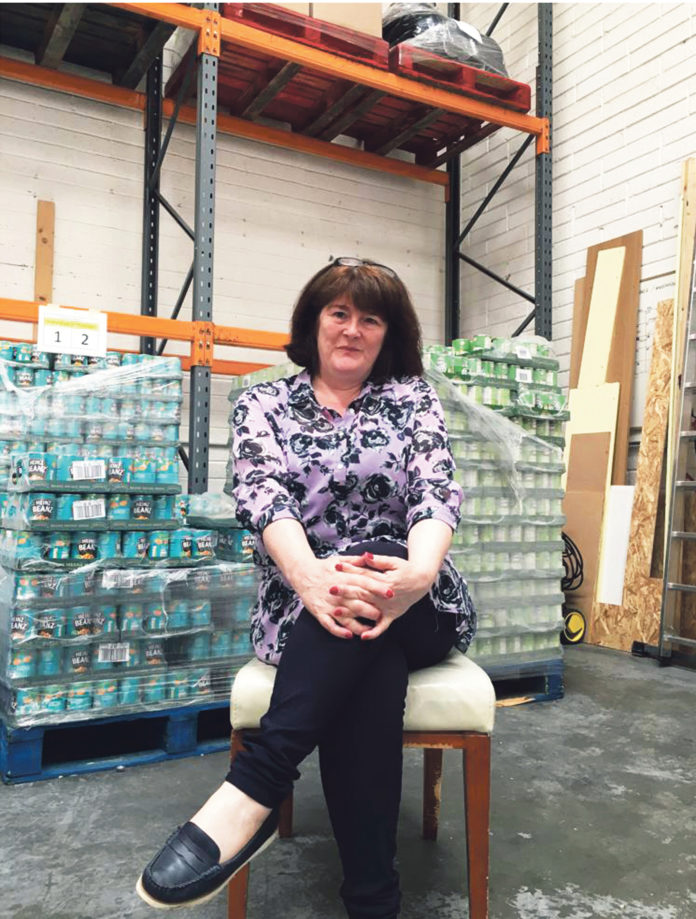
FAMILIES going hungry in Limerick is intergenerational with a perpetual gap between the rich and the poor – the haves and the have nots.
And, according to Mid West Simon chief executive Jackie Bonfield, a person doesn’t have to be lying in the gutter, or begging on the street, to be classified as poor.
A food bank, run by Jackie Bonfield and her team on the Ballysimon Road, fed 6,380 families and individuals last year. This included 3,182 children.
She says there has been a rise working to middle class homesteads receiving food bags with each family getting a ration of peas, beans, pasta, cereal, and tea bags.
“Coffee would be a luxury item,” Jackie Bonfield says, and therefore is not included.
The mother-of-two, who commutes to her office from Kilrush, paints a bleak picture of the situation in Limerick and beyond into Clare and Tipperary.
“Limerick would be one of the worst areas in the country for poverty. What we are also seeing here is that there is a lot of hidden poverty.”
There is a growing number of families turning to moneylenders which can bring even more problems, depending on who the lender is.
“There is poverty in places where people aren’t necessarily seeing it.
Poverty is when you can’t have a roast meal once a week; or you don’t have two pairs of shoes; or you don’t have warm clothes. There are people in this city who don’t have two pairs of good shoes, nor a warm coat to put on when the weather gets bad, nor fuel to turn on the heating.”
The hidden homeless are families and individuals who may have a job, a car, a home, but who may be struggling with a mountain of debt and can’t afford to put dinner on the table.
“There are people turning on one light in their home because they can’t afford electricity while others are living in emergency accommodation.
“The amount of people looking for food is staggering. Four hundred families and 174 individuals receive food bags every two weeks from Simon. An extra 2,000 mouths were added to the register for July, August, September last year.
For the same period this year, Jackie Bonfield and her crew expect to be “inundated” with further registrations from parents crippled by back to school costs.
“It always goes up at this time,” says Jennifer Walsh, who organises food deliveries to families, individuals, and breakfast clubs.
She found “it was a huge shock at the start” when she joined Simon Mid West two years ago.
“Nothing prepares you for the poverty that is out there,” she says.
The Simon workers are continuously “reassessing” the register to eliminate abuse of the system but even then the food bank, which is funded by government, is struggling to cope with the demand.
Often, stock is critically low, which Walsh describes as “frightening”.
“It is because we could run out of food,” Bonfield adds.
They’d like to see a “social grocery” replace the current food bank system.
Bonfield explains: “Instead of people being given a black bag — which is very disrespectful in a way – they would be able to come into a closed shop environment and pick the products they want. They wouldn’t be taken stuff they didn’t want or use, and they would feel they would have choice, and use their own shopping bag, which would also mean we wouldn’t be buying black bags which would save us about €9,000 a year”.
The current system is subsidised by the European Union, yet, “there is no other funding to run the food bank – so the food, the warehouse, the forklift hire, the black bags are all paid for through donations from the public.
“We operate on a very tight budget and depend on volunteers. We also provide training and work opportunities for people convicted by the courts, and who who may be struggling to find a job,” Bonfield explains.
And she has put out a call for a premises in Limerick to provide a base for the “social grocery”.
Simon is also providing a tenancy support service and housing scheme for people struggling to stay in their homes.
It provides accommodation in 60 properties throughout the region for families and individuals and it runs an emergency hub accommodation service on the Dublin Road, providing ten families with an extended B&B.
Last year Bonfield piloted a fund for European Aid (FEAD) to the most deprived through the Department of Social Protection which has since been rolled out nationally and provides educational tools for vulnerable children.
“We’ve got 4,500 student packs coming to us in the next couple of weeks – rulers, copybooks, folders, calculators, highlighters, memory sticks and water bottles.
Despite the daily challenges, Bonfield remains committed to the task at hand.
She sums up the dreadful experience of those who look like they’re living within their means, but are actually living on the margins, cramped together in a hotel room or not being able to invite their friends to their accommodation for their birthday.
“As much as the hubs are better than the hotels and the B&Bs, they still don’t allow for an individual’s personal development; to allow for the family to be a proper family, and to be able to fight, to love, to do whatever they need to do.
“Sometimes you don’t want to look at your children for an hour or a day, and sometimes you just want to spoil one child because they’ve had a tough day at school. These families don’t get to do that.”


